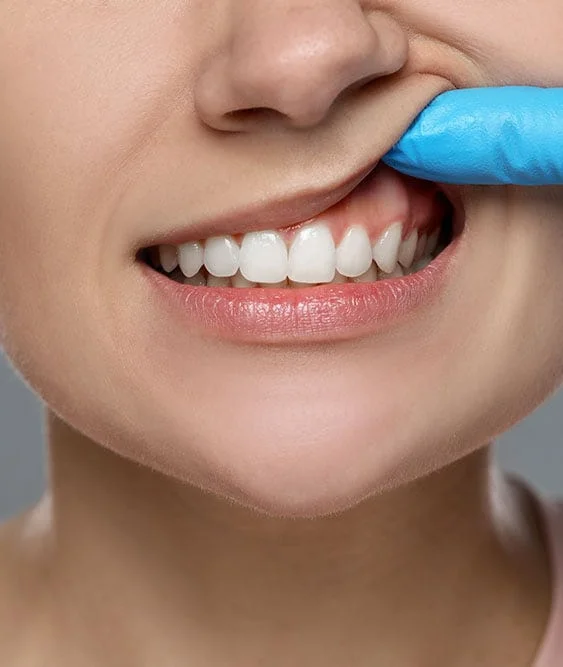Periodontal Care
Periodontal disease, or gum disease, is prevalent among American adults and begins as common gingivitis. Gingivitis is a condition typically characterized by irritation, inflammation, or bleeding of the gums. More severe forms of periodontal disease, which develop from untreated gingivitis, are considered progressive conditions that can lead to connective tissue and jawbone damage. When left untreated, periodontal disease can also lead to problems such as receding gums, bone loss, loose teeth, tooth loss, and even serious risks to your overall health.
For these reasons, Dr. Rafael Yanez recommends frequent oral/periodontal exams so the disease can be caught in its earliest stages. Early detection allows for prompt treatment and the prevention of more complicated issues. Since some patients may not exhibit symptoms of gum disease until its advanced stages, frequent preventive exams are particularly important for maintaining good oral health. A periodontal exam can be easily performed as part your twice-yearly routine dental check-up with our dentist.

Types of Periodontal Disease
When gingivitis is allowed to worsen, plaque hardens into tartar, the gums recede from the teeth, and harmful bacteria multiply, causing increased irritation and infection. To determine if you have periodontal disease, Dr. Yanez will examine the gums for any inflammation or bleeding, inspect pocket depths between the teeth and the gum line, and check for unusual tooth movement. Periodontal disease can manifest in a number of different ways and is considered the leading cause of tooth loss among adults in the United States.
The most common types of periodontal disease include:
- Chronic periodontitis: The most common form of periodontal disease, chronic periodontitis is characterized by a progressive loss of the bone tissue that surrounds the roots of the teeth and holds them in place. Inflammation of these tissues that support the teeth can cause the formation of deep pockets around the teeth in addition to gum recession. This progression of tissue loss is typically gradual, interspersed with periods of more rapid bone loss. Your teeth may appear longer as a result of this tissue loss.
- Aggressive periodontitis: Characterized by rapid loss of gum attachment, chronic bone damage, and familial aggregation, aggressive periodontitis most often occurs in otherwise clinically healthy patients.
- Necrotizing periodontitis: This form of periodontal disease is characterized by tissue death in the periodontal ligament, alveolar bone, or gingival tissues. Necrotizing periodontitis typically occurs in patients who suffer from systemic conditions such as HIV, immunosuppression, or malnutrition.
- Periodontitis caused by systemic disease: This type of periodontitis resembles necrotizing periodontitis but often begins at an early age due to medical conditions such as respiratory disease, diabetes, and heart disease.
Treatment for Periodontal Disease
Dr. Yanez will choose from a number of available surgical and non-surgical treatments to treat your periodontal disease depending upon your individual circumstances. Before selecting a treatment method, a complete periodontal exam will be used to determine the unique condition of your teeth, gums and jawbone. Afterward, Dr. Yanez will choose the method that can best address your specific type of periodontal disease.
The most common treatments for periodontal disease include:
- Scaling and root planing: When bacteria and tartar (also called calculus) are the initial cause of periodontal disease, these infectious agents must be removed to preserve the health of the gum tissue. In order to eliminate harmful bacteria and tartar, Dr. Yanez will thoroughly clean the gum pockets and treat the site of the infection with antibiotics. In addition, Dr. Yanez may recommend a prescription mouthwash to incorporate into your daily oral hygiene routine to help prevent recurrence.
- Tissue regeneration: If significant amounts of bone and gum tissue have been destroyed due to periodontal disease, grafting procedures can be used to regrow and rejuvenate the affected areas. In some cases, a membrane may be used to assist in this regeneration process. Tissue regeneration can strengthen weakened tooth support and help prevent tooth loss.
- Pocket elimination surgery: Pocket elimination surgery (also known as flap surgery) is a surgical treatment that can reduce the space between the teeth and the gums. This procedure minimizes the spaces where harmful bacteria can colonize. In addition, surgery on the jawbone can eliminate indentations that can foster bacteria and lead to further damage.
- Dental implants: If periodontal disease has reached such an advanced stage that the patient has suffered tooth loss, dental implants can restore both the functionality and the aesthetics the mouth. Dental implant surgery uses artificial teeth that are individually fused to the jawbone for results that look and feel natural.
FAQs (Frequently Asked Questions) About Periodontal Treatment
Want to learn more about periodontal disease and treatment? Dr. Yanez has answered some commonly asked questions about this field of dentistry and what it means for you. For more comprehensive information, or to schedule a consultation with our dentist, please contact our office.
What is periodontics?
There are nine dental specialties recognized by the American Dental Association (ADA), and periodontics is one of them. This field is concentrated on the diagnosis and treatment of the soft and bony structures that support the teeth and jaw. Periodontists are extensively trained to address concerns related to the gums and jawbone and help keep your smile looking its best and your teeth functioning as intended. In many cases, the periodontist works alongside a dentist or another dental professional to achieve the desired outcome. Many periodontal treatments can be performed by an experienced dentist or dental hygienist, and routine check-ups help patients maintain healthy gums and teeth and limit the risk of developing gum (periodontal) disease.
What are some common signs of periodontal disease?
Periodontal disease often begins as gingivitis, a concern where the gums become red, swollen, and inflamed. Some of the other symptoms of periodontal disease include:
- Bleeding gums following brushing and/or flossing
- Loose teeth, or teeth that appear longer than normal
- Formation of large spaces between teeth
- Receding gumline
- Chronic halitosis (bad breath)
Gum disease doesn’t just mar a beautiful smile; this condition can lead to more significant health problems that go beyond the mouth, including an increased risk of stroke. Diabetes and heart disease are some of the other health problems that can worsen with untreated periodontal disease. If you believe you may have irritated gums, talk to us for help.
What causes gum disease?
The most common cause of gum disease is bacterial infection generated by tartar buildup, which can only be removed by a dentist or dental hygienist. But that’s not the only factor that can lead to this issue. Examples of other influential elements include tobacco use, hormonal changes, genetics, stress, certain medications, poor nutrition, drug or alcohol abuse, and immune system deficiency. We will evaluate your gums, review your medical history, and discuss your experiences to help determine what factors may be contributing to your periodontal concerns. By identifying the source of the problem, we can help you effectively address it.
Who is at risk of developing gum disease?
If you have a contributing factor such as diabetes or heart disease, genetic influences, tobacco use, or poor oral hygiene habits, we can go over ways to limit your risk during your initial consultation. Some people may naturally have a predilection to developing gum disease, but there are always opportunities to help reduce the likelihood. If you notice red, bleeding, or swollen gums, contact us for an evaluation.
Does dental insurance cover the cost of treatment?
Every insurance plan is different, but dental coverage often includes assistance for periodontal treatment. We work with a wide range of insurance providers to help keep your oral health procedures within your budget, and we also offer financing options in the event you would like to pay out-of-pocket.
If you would like to learn more about maintaining a healthy mouth and our custom-tailored approaches to periodontal care, please contact us today.

